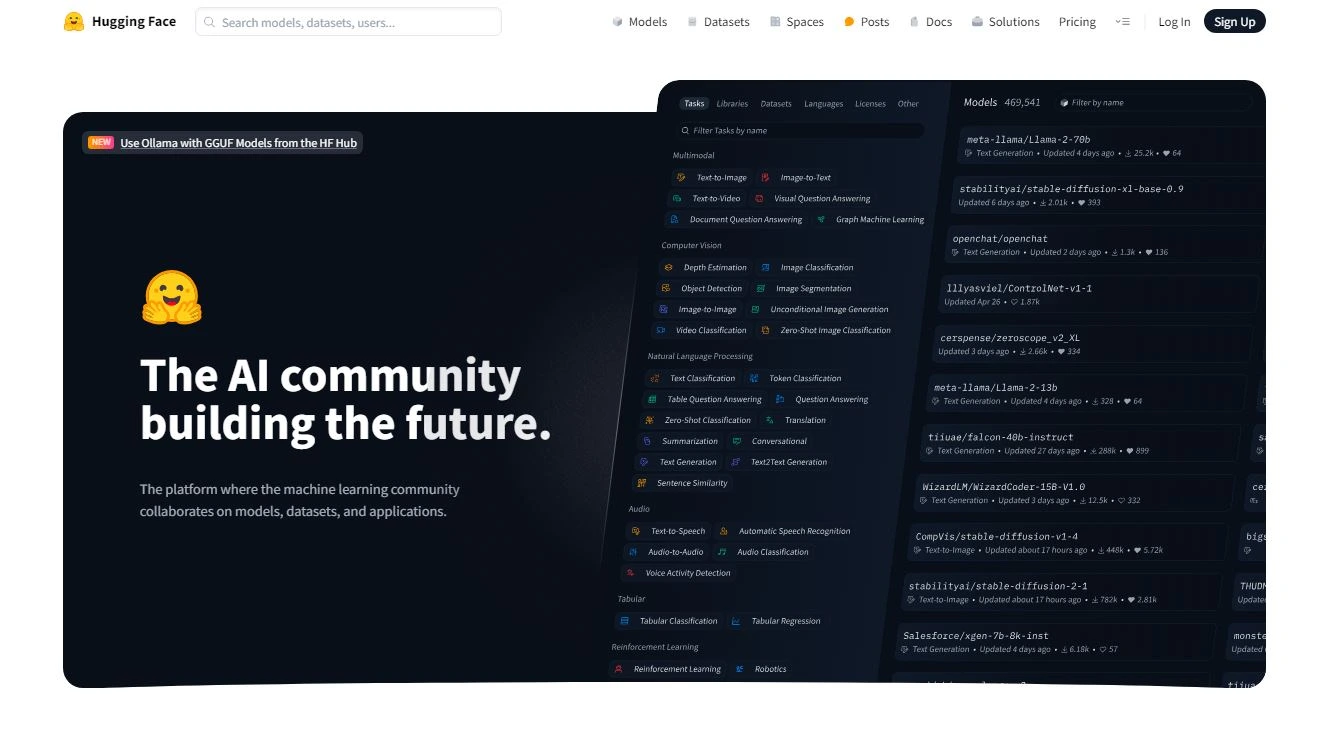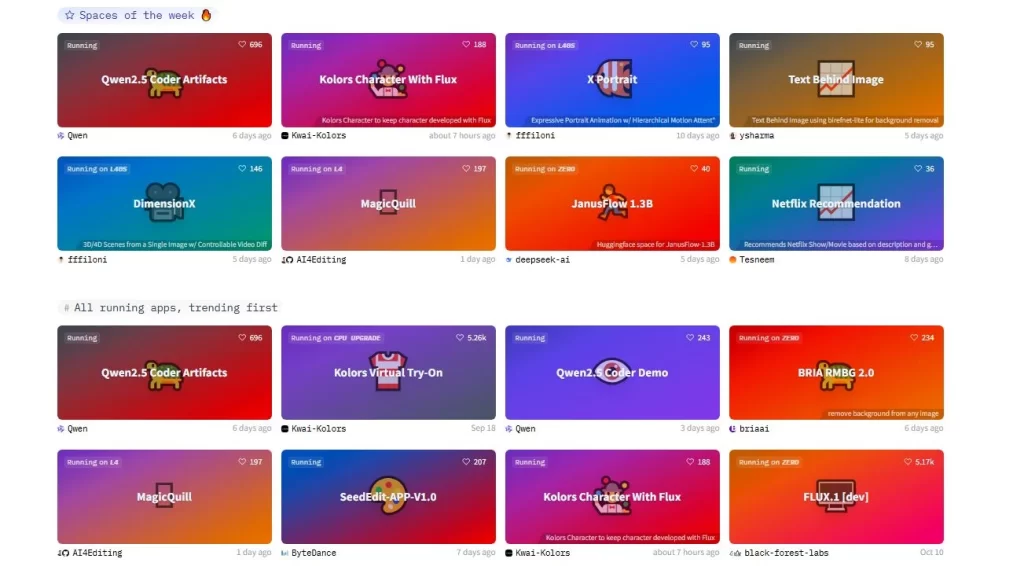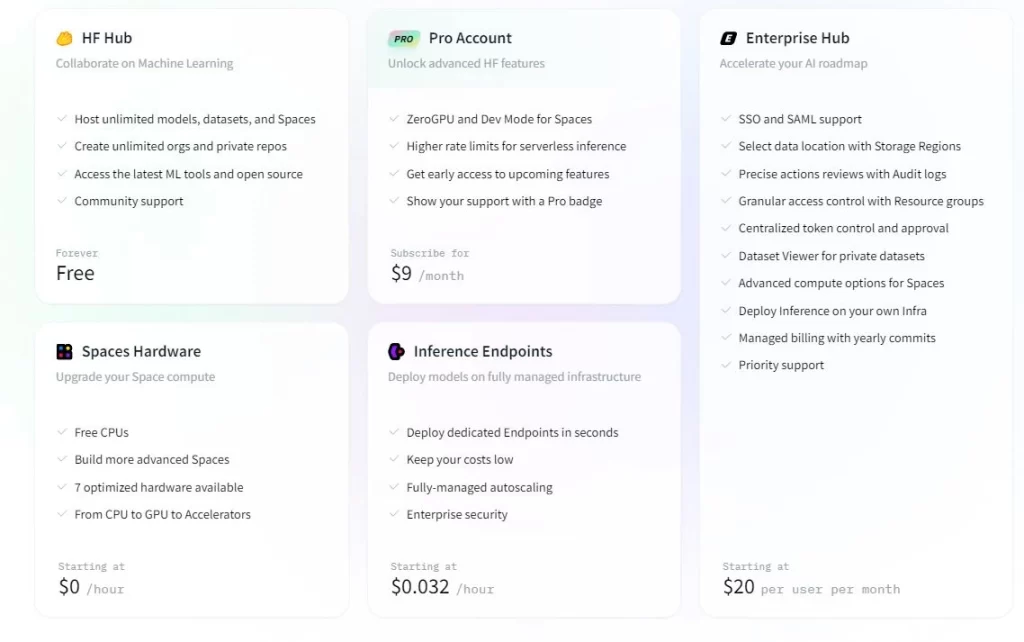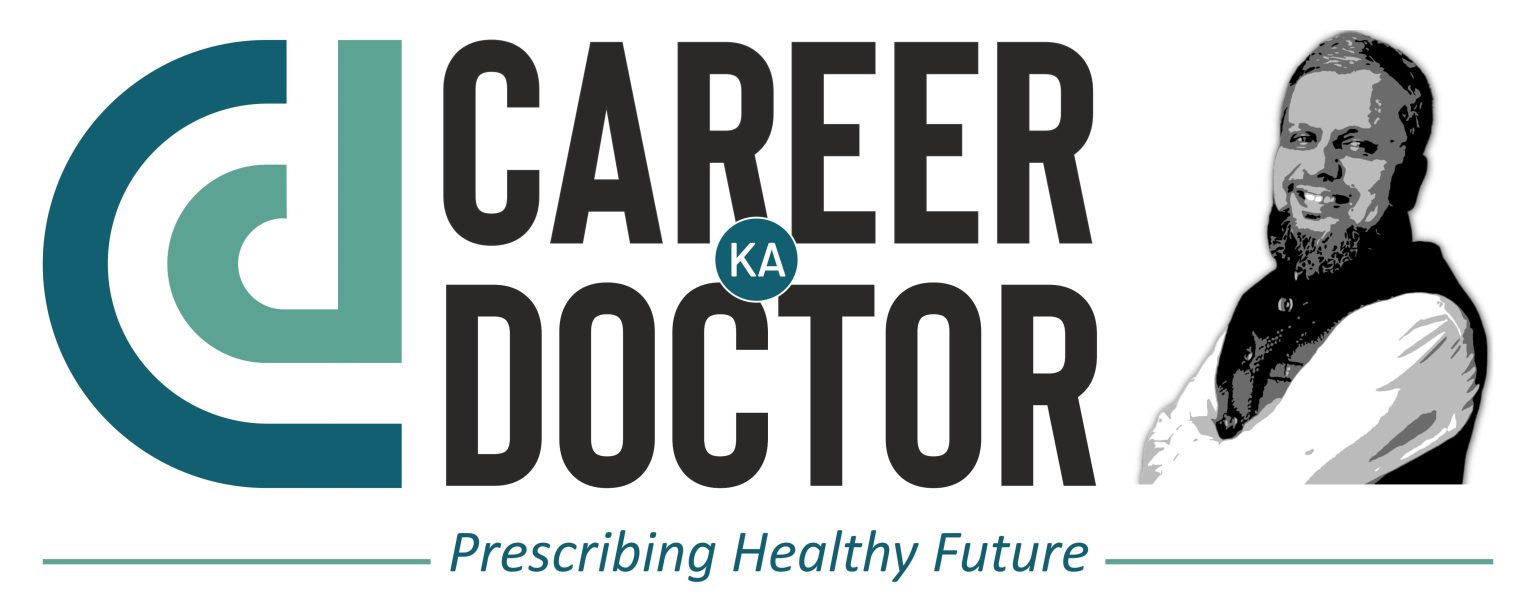Hugging Face: A Leading AI Tool for Natural Language Processing (NLP): Hugging Face is a leading AI platform specializing in natural language processing (NLP) and machine learning models. With an expansive collection of pre-trained models and tools, it empowers developers and businesses to integrate advanced AI features into their applications easily. Hugging Face provides a robust platform for tasks such as text generation, sentiment analysis, language translation, and more. Its user-friendly interface and open-source model make it a popular choice among both beginners and experienced AI professionals

Contents
5 Benefits of Using Hugging Face
- Access to Pre-Trained Models: Hugging Face provides an extensive library of pre-trained models, which saves developers time in building and training models from scratch.
- Scalability: The platform can easily handle large-scale NLP projects, making it suitable for both small businesses and large enterprises.
- User-Friendly Interface: Hugging Face’s intuitive interface and well-documented APIs make it easy to use for developers at all skill levels.
- Open-Source and Community Support: Being open-source, Hugging Face is backed by a large, active community that continually contributes to the development and improvement of models.
- Cross-Platform Compatibility: Hugging Face models can be integrated into various environments, including cloud-based platforms, on-premise systems, and local applications.
Features of Hugging Face
- Pre-Trained NLP Models: Hugging Face offers a wide selection of pre-trained models for various NLP tasks, such as text classification, sentiment analysis, text summarization, question answering, and more. These models save valuable time and resources, as users don’t have to train models from scratch.
- Model Hub: Hugging Face’s Model Hub is a central repository of thousands of pre-trained models contributed by the community. These models are built for different use cases, including text generation, translation, and speech recognition, and are easily accessible via the Hugging Face API.
- Transformers Library: The Transformers library by Hugging Face is an open-source platform that provides access to the most advanced pre-trained transformer-based models, including BERT, GPT, T5, and more. This library supports various tasks like text generation, translation, summarization, and question answering.
- Datasets and Tokenizers: Hugging Face offers an extensive collection of datasets and tokenizers that support machine learning and NLP tasks. The platform simplifies the process of data preprocessing and model training, enabling users to access and work with datasets more efficiently.
- Custom Model Training and Fine-Tuning: Hugging Face allows users to fine-tune pre-trained models on their specific datasets. This flexibility enables users to build highly customized models for specialized NLP tasks while reducing the need for extensive computational resources
Also Check : PHINIA Scholarship Program 2024-25 for UG Students
5 Problems with their solutions that Hugging Face can solve it
1. Problem: Difficulty in Training NLP Models from Scratch
Solution: Hugging Face provides a wide range of pre-trained models, allowing users to skip the complex process of training models from scratch
2. Problem: Lack of Access to Advanced NLP Models
Solution: Through the Model Hub, users can easily access state-of-the-art NLP models such as GPT, BERT, and more
3. Problem: Time-Consuming Data Preprocessing
Solution: Hugging Face offers ready-to-use tokenizers and datasets, streamlining the data preprocessing step
4. Problem: Need for Custom NLP Solutions
Solution: Hugging Face allows users to fine-tune models with custom datasets, making it easier to create models tailored to specific tasks
5. Problem: Complex Integration into Applications
Solution: Hugging Face provides easy-to-use APIs and libraries, making it seamless to integrate NLP models into applications and services

Frequently Asked Questions about Hugging Face
Q1.What is Hugging Face?
Hugging Face is an AI platform offering pre-trained models, tools, and libraries for natural language processing tasks.
Q2. Can I train my own models with Hugging Face?
Yes, Hugging Face allows users to fine-tune and train custom models on their own datasets.
Q3. Is Hugging Face open-source?
Yes, Hugging Face is an open-source platform, and many of its tools and models are available to the community.
Q4. What programming languages does Hugging Face support?
Hugging Face primarily supports Python and offers easy-to-use libraries and APIs for integration.
Q5. Is Hugging Face suitable for beginners?
Yes, Hugging Face is beginner-friendly with comprehensive documentation and an active community.
Hugging Face: Pricing Plans
Hugging Face offers a range of pricing plans to cater to different types of users.
- Free Tier: Ideal for individuals and developers looking to experiment with Hugging Face models, providing access to public models and limited storage.
- Individual Plan: This plan is designed for professionals who require private model access and additional resources, with more storage and API usage than the free tier.
- Team Plan: Aimed at small teams, it offers collaboration features, enhanced performance, and more robust API access.
- Enterprise Plan: For large organizations, the enterprise plan includes dedicated support, custom models, and advanced scaling options

Also Check : Video Editing & Graphic Designing Internship by Immi Talks Overseas Education
Conclusion
Hugging Face is a versatile and powerful platform for anyone working with natural language processing tasks. With its vast collection of pre-trained models, datasets, and robust APIs, it simplifies complex AI workflows, saving both time and computational resources. Whether you’re a developer, researcher, or business, Hugging Face offers the tools and flexibility you need to implement advanced NLP solutions. Its open-source nature and extensive community support make it an ideal choice for anyone looking to harness the power of machine learning for NLP tasks.
Also Check : Akool: Revolutionizing Creative Content with AI









